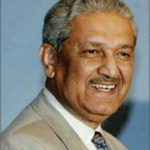

Go to Admin » Appearance » Widgets » and move Gabfire Widget: Social into that MastheadOverlay zone

Author: Dr. A Q Khan
Last week I received a beautiful message from Munawwar Rana, who left Allahabad and migrated to Pakistan. It contained the feelings of a refugee (like me) who left what now seems like paradise and landed in an unfriendly place lacking in law and order, etc.
Since it came so close to my situation, I read it many times, often closing my eyes and going back 75 years to a time when I was going to school, playing hockey, swimming, catching delicious sweet-water fish, going to the forest to eat custard apples, mangoes, guavas, tamarind, etc with friends – in Bhopal. I have travelled much while studying and during service in Europe and Pakistan, but have never found a place more beautiful than Bhopal state. There were five lakes in the city, two of them huge ‘talaabs’. All of them contained a variety of delicious fish and the forests were full of wildlife.
The state, at that time, was very well off – no unemployed people and no beggars. It was totally self-sufficient. There were more than 400 mosques and thousands of huffaz. The city also had an active cultural life. Every year there was a mushaira in which Josh, Jigar, Hafeez Jalundhari, Firaq Gorakhpuri, Moen Ahsan Jazbi, Asghar Sheri, etc took part and mesmerized the audience.
I realize now that my decision to return to Pakistan from Europe with a technical experience and know-how worth more than $2 billion was based on emotion, not wisdom. Before I left for Berlin in 1961, I was aware that all was not well within the country – provincialism, religious bigotry, corruption, etc. I left a highly respected, well-paid job and an offer of a professorship to come back to Pakistan at Bhutto’s personal request and motivated by seeing the disgraceful defeat and surrender of our army in 1971.
After taking charge of the nuclear programme, I soon realized that our decision (jointly taken by my wife and I) was not based on sound judgement but contained a large emotional element. My family and I paid a heavy price for that decision. We, all the dedicated engineers and other people who worked so hard, for such long hours and with such devotion, all paid heavily in terms of family life and later – many of them in terms of loss of freedom and being treated as traitors at the hands of a dictator and his cronies. Even today I have a feeling of resentment against those who benefitted most from our efforts but who never acknowledge it and actively took part in disgracing us all.
Here is a free translation of the poem that brought all this on. “We are refugees who left behind as much as you have here. For the sake of a piece of the earth, we left behind stacks of gold. We left behind the bread bin in which our mothers put fresh, hot bread. I still feel as if I have left my house, lane and neighbourhood. The sparrows on our roof still pray for my return. Still remember and miss the beautiful scenes in Allahabad.
“This was not migration, perhaps it was our cowardice that we left behind an ailing person. My wife did manage to come, but I left my mother. It was like picking up brass and leaving behind gold. My mother always murmured in half sleep that we had left the mint on the roof to dry. Even ministership has no value since I left my mother with a piece of bread in her hand. All the rivers originating from the Himalayas used to call us for vuzu. Wherever I do vuzu, I miss the banks of the Jamuna river.
“Whenever I meet an old acquaintance from there, I wonder whether I lost my spectacles or my eyes. We left behind that tolerance, love and affection and then moving around with a rosary of a Sadhu. It is a joke that I behave like Yousuf and am stupid that Laila was left behind. The eyes which we left behind lost their sight in waiting for our return. Even the moon is not friendly to us here and we left behind a beautiful moon shining upon the lake. This two-bedroom hot dwelling here, it is no more than the rooms of our servant we left behind.”
It is impossible to translate the soul of Urdu poetry into English prose. One has to read the original text to be able to appreciate it.
Note: Eidul Fitr is just around the corner. Heartiest Eid greetings to all Pakistanis, wherever they are. May the Almighty shower His infinite blessings on all of them – Ameen.
(Published in Monthly Tribute International on 01-06-2019)
You must be logged in to post a comment Login